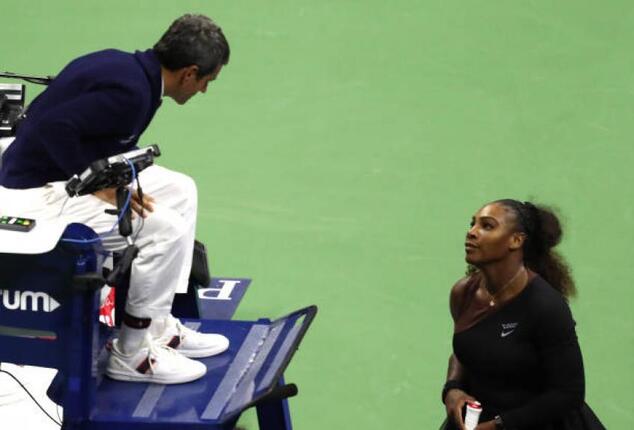|
EITHER: Serena Williams was a bad sport whose behavior on the tennis court was out of line and deserving of the penalties imposed on her by umpire Carlos Ramos, who observed the rules strictly but by the book; OR: Serena Williams was the fed-up victim of sexism on the tennis court who rightly spoke up for herself when she was penalized for violations that would have been overlooked if committed by a male player; OR: Serena Williams was treated inequitably on the court but she still shouldn't have disputed the umpire's rulings in the way that she did or disrupted the game with her outbursts, keeping the attention on herself,
The above are the three sides of the argument that has continued to percolate since last week when Serena Williams lost her cool and the U.S. Open Grand Slam Tennis Championship in a match that, for better or worse, is going down not as young Naomi Osaka's moment of sweet triumph over one of the greatest women's tennis stars in history, but as Serena William's moment of either behaving terribly or throwing down the gauntlet before discrimination against women in sports. Or both. But in truth I don't believe that Serena's behavior during the Grand Slam had anything to do with speaking out against sexism in sports. Nor do I think it was just a manifestation of bad sportsmanship over being docked first a point then a game. I think that sexism in sports and bad sportsmanship in sports are bigger themes that Williams' behavior morphed into, talking points that could be grasped and discussed by the media and the rest of us. In truth I don't believe that what transpired during the Grand Slam was the result of unfair treatment or a lack of sportsmanship. I believe that Serena Williams behaved the way she did, not because she believed she'd been cheated; but because she believed she'd been herself called a cheat. And this accusation she could not take. It totally unnerved and distracted her. It was driving her crazy and may well be what caused her to lose the Grand Slam championship. The chain of events began when Umpire Ramos issued a violation against Williams after her coach, Patrick Mouratoglou, ...gave her a "thumbs up" from the sidelines that she may or may not have seen but that Ramos interpreted as coaching, which is not allowed during tennis matches and can be - but apparently seldom is - held against the player, as Ramos, in this case, opted to against Serena Williams.
But it was obvious that inside Serena Williams was burning and churning. She returned to Ramos again and, her voice still emotional and supplicating, insisted that she didn't cheat, she wasn't a cheat, she wanted him to know that, and when he acknowledged that he knew this, she thanked him. Still Serena's inner turmoil over this accusation against her was neither calmed nor assuaged, and after a backhand error she threw her tennis racket to the ground in anger and was given a violation for racket abuse then docked a point, this being her second violation. She again approached the umpire's chair, this time with fire in her eyes. She wasn't there to dispute the second violation or even the loss of the point, but to insist that she hadn't received coaching, that she hadn't cheated, that she never cheated. She insisted then insisted again that Ramos make and announcement that she hadn't been coached, that she hadn't cheated. She insisted, then insisted again, that he apologize to her, publicly. She began shouting,almost sobbing, that she had a daughter and would stand for what was right for her daughter's sake. And I believe that was the really at the heart of what was driving Serena Williams to distraction: not that she'd been the unfairly penalized or even that she might lose the game, but that she'd been accused of cheating and how could she be a good mother to her daughter with such a blight on her character? Though everyone else may not really have cared about the coaching violation or held it against Serena William's character, Serena Williams did. In her mind this violation was amplified as a big black mark against her good name, which she could not abide if she were to be a good mother to her baby daughter. And this worry must have been eating at her throughout the remainder of the match, as seven times she approached the chair to protest or cried out against being accused of cheating, one time calling Ramos a thief of the point she lost, for which the umpire docked her the whole game. But the Grand Slam was lost for Serena Williams the moment she was accused of receiving coaching, which she interpreted as an accusation of cheating. It was that accusation, and not discriminatory treatment or bad sportmanship, that caused Serena to lose control of her emotions on the tennis court. She just never recovered from that accusation, crying out even as she exited the court after her loss of the championship that she was owed an apology. Not for sexism, but for what she saw as the diminishment of her reputation. After the game Serena's Coach Patrick Mouratoglou nonchalantly admitted in an interview that he had been attempting to coach her, though she didn't see him, and that one hundred percent of coaches coach at one hundred percent of matches though no one ever gets called for it, nor had he ever been. He found it strange that something everyone does all the time was suddenly called by this umpire. Ultimately, though, maybe what happened on the court of the Grand Slam actually was at its root a problem of sexism. After all, in the end it came down to a woman having to suffer the consequences of actions and decisions made by men. References
https://www.youtube.com/watch?v=uiBrForlj-k https://www.nytimes.com/2018/09/09/sports/serena-osaka-us-open-penalty.html?action=click&module=RelatedCoverage&pgtype=Article®ion=Footer http://www.dispatch.com/opinion/20180912/billie-jean-king-williams-made-point-to-stick-up-for-herself
0 Comments
Leave a Reply. |
"Tropical Depression"
by Patti Liszkay Buy it on Amazon: https://www.amazon.com/dp/B0BTPN7NYY "Equal And Opposite Reactions"
by Patti Liszkay Buy it on Amazon: http://amzn.to/2xvcgRa or from The Book Loft of German Village, Columbus, Ohio Or check it out at the Columbus Metropolitan Library
Archives
July 2024
I am a traveler just visiting this planet and reporting various and sundry observations,
hopefully of interest to my fellow travelers. Categories |












 RSS Feed
RSS Feed